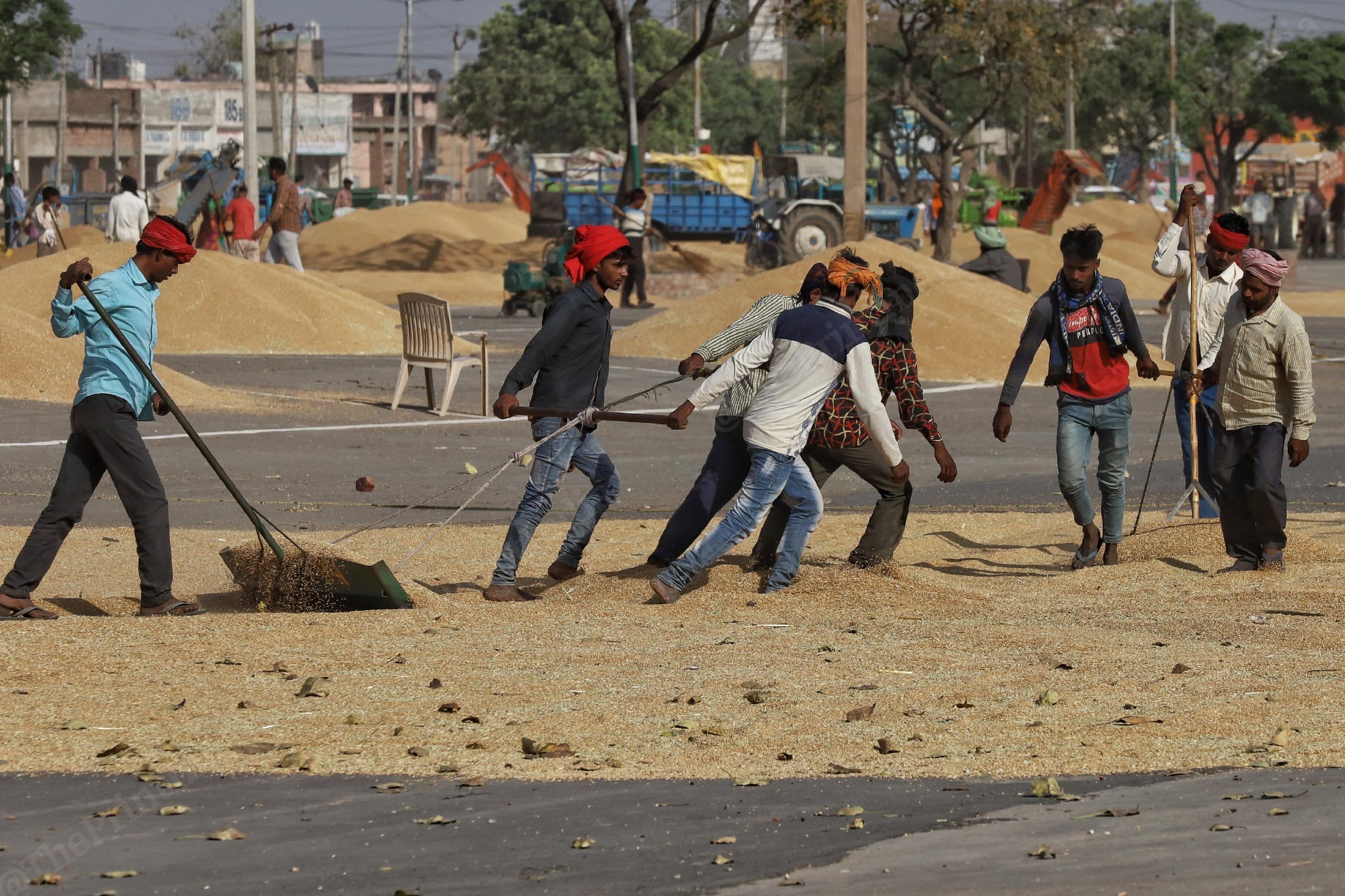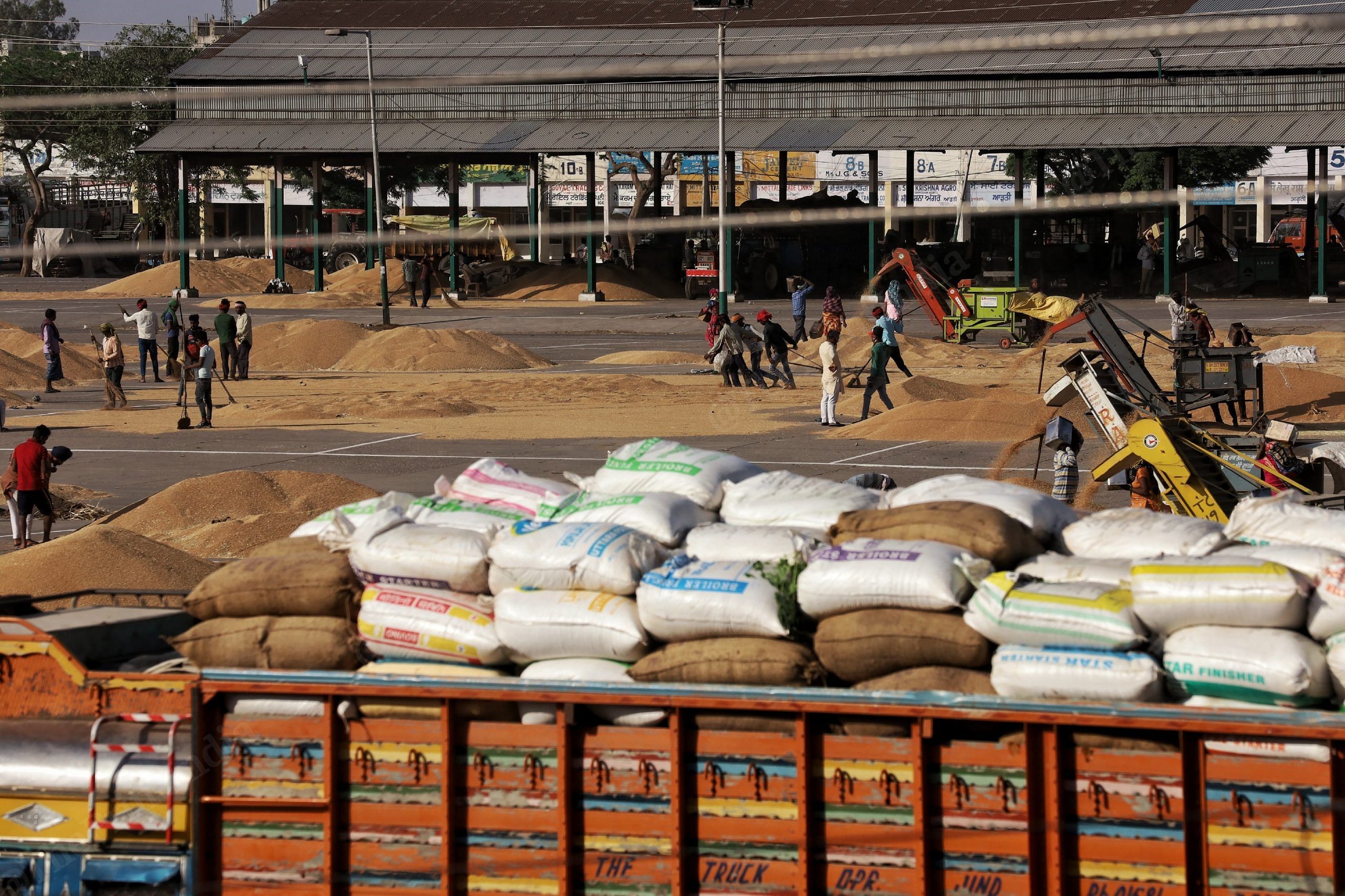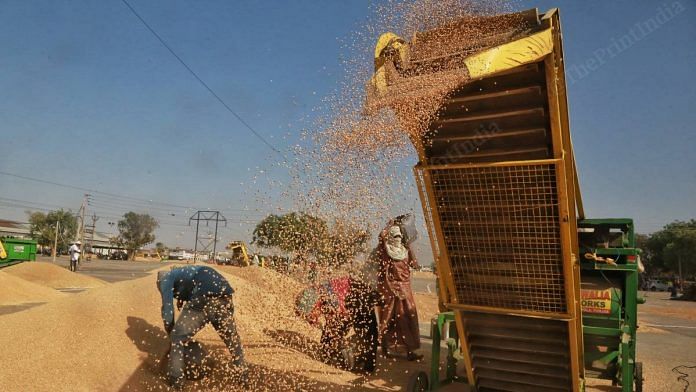Rajpura: Punjab Saturday finally implemented direct benefit transfer (DBT) for farmers on the first day of the rabi wheat procurement season after resisting the Centre‘s direct online payment initiative. The roll out, however, was delayed by a few hours as the state worked to assure arhatiyas, or commission agents, who had called a strike to protest against the implementation of DBT.
Arhatiyas, who facilitate food procurement in the state, have been protesting against the state-Centre agreement over DBT as the system directly transfers payments to farmers instead of the current practice of the state routing these payments though them.
Punjab Finance Minister Manpreet Singh Badal Thursday said the state government had “no choice” but to implement the Centre’s instruction on DBT after it threatened to not procure foodgrains from the state if the system wasn’t implemented this season.
Punjab Chief Minister Amarinder Singh, who held a meeting with the arhatiyas Saturday, has assured them that a modification will be made in the state’s current online procurement portal to make the agents an integral part of the payment disbursement system to farmers, along with their commission. He also announced various other measures, including releasing dues worth Rs 131 crore to arhatiyas without waiting for funds from the central government.
The arhatiyas say the central government should have provided a choice to farmers rather than force a complete shift to online direct payment system. The sentiment is echoed by farmers too.
“Even if the government wants to provide direct payment for us, they should give at least some payment like 10 or 30 per cent through arhatiyas so that our borrowing relationship continues smoothly. Else if our complete payment will be made directly online, then arhatiyas will not get their recovery of the loan in time and, in turn, refuse to lend us money in the time of need,” said Inderjeet Singh, a farmer from Haripur village in Fatehgarh Sahib district who arrived with wheat produce from 9 acres of his farmland.
“Government will not give us loans or money before the crop harvest, unlike arhatiyas who gives us loans at any time,” Singh told ThePrint.

Hari Chandra Fauji, an arhatiya in Rajpur mandi said, “With the introduction of the online direct payment to farmers, small farmers will be most hurt as he can only approach us in the event of the need to borrow money from us rather than going to banks and governments. However, bigger farmers who own 100-200 acres have a deposit and other assets so they don’t rely on anyone else to borrow funds in a time of need.”
Some arhatiyas also appealed for the formulation of a policy to improve the agricultural marketing system in the country rather than “wiping them out”.
Punjab says neither arhatiyas nor farmers need worry about these agents being cut out of the procurement system or local agricultural framework.
Speaking to ThePrint, state Food Minister Bharat Bhushan Ashu said, “We have made arrangements to tag every arhatiya with their farmer so that none of them are alienated in the process of procurement and receive their due amount. Simultaneous fund transfer will take place in the account of farmers as well as arhatiya as soon as the crop is procured by the agencies. The food department will develop the new procurement portal accordingly.”
In its negotiations with the Centre, Punjab had sought to explain the role arhatiyas play in the local agricultural framework, including providing loans to farmers. But the Centre sees DBT as a way to boost transparency and prevent exploitation of farmers by middlemen.
Almost 130 lakh metric tonnes of wheat is expected to arrive in Punjab’s mandis in the next two months, most of which will be purchased by the Government of India at the minimum support price (MSP) of Rs 1,975 per quintal. The Reserve Bank of India (RBI) has already cleared Rs 21,650 crore worth of credit cash limit for the procurement.
Also read: Why Punjab finally relented on direct payment for farmers at 2-hour meet with Piyush Goyal
‘DBT a benefit but will disrupt ability to get loans in future’
Despite the state’s assurances, the agreement between Centre-state has left farmers and arhatiyas anxious and upset over what they consider an imposition of the direct online payment by the central government.
Baldev Singh, a farmer from Thuha in Rajpura, said, “Even though the government wants to implement the direct online payment for our benefit as it will definitely increase the initial payments for us after selling our crop … it will disrupt our years of relationship with arhatiyas of crop and personal loans as they will fear not getting their loan installment and interest in time, and as a result, in future, may refuse to give loans to us at all.
“Primarily, payment should be from arhatiyas as we can borrow money from them on the basis of that. We should have rather [been] given a choice about what mode of payment we want — payment online or through arhatiyas,” Baldev said.
Ravi Kant, a commission agent in Rajpura mandi, said the choice of payment should be left to producers or farmers since there is no difference in the pricing of the foodgrain.
“Government will also give MSP to farmers, and so during the procurement process, we issue J form to farmers [with] details of amount, address, rate and other details of crop procurement. [The price] couldn’t have been below MSP in any case, so we also provided MSP to farmers … Henceforth, the government should leave the online payment to the discretion of producers as they will get the same price for their price in both the cases,” he said.
He went on to explain that advantage of having an arhatiya in the process gives farmers an option for advance loans.
“In our case, we provide advance loans and other facilities to farmers as we are not commission agents but service providers, hence we charge for the same from farmers and buyers. We provide every bit of services to facilitate foodgrain procurement such as labour, packing, weighing, drying of grains, etc.,” Kant said.
Also read: MSP, subsidies are at root of Punjab’s farm crises but its farmers are fighting to keep them
‘Reforms shouldn’t wipe out service providers like us’
Some arhatiyas are hopeful that a middle ground can be arrived at between the state, farmers, arhatiyas and the central government regarding the reforms in the agricultural marketing system.
Hari Chandra Fauji, the arhatiya from Rajpur mandi, said, “We appeal to honorable Prime Minister Narendra Modi to sit with experts and representatives of farmers and service providers like us to formulate a policy to improve the agricultural marketing system in the country rather than trying to wipe us out from the face of agricultural scenario in the country.”

Talking about the state’s negotiations with the Centre, Food and Civil Supplies Minister Ashu said, “In the meeting wherein we accepted the central demand of implementing online direct payment to the farmers, some of our demands such as releasing old dues of arhatiyas were also accepted by the Centre. We asked the central government to give us some more time to put in place a robust system to ensure direct online payment to both farmers and arhatiyas but the Centre threatened us that either we implement the system in the current season or they will not lift the foodgrain from the state.”
On the release of the pending rural development fund (RDF) to the state government, the minister said about 3 per cent RDF is fixed for Punjab but the state is getting only 1 per cent, and the remaining 2 per cent is pending. The Centre also assured it will release the dues worth Rs 15,000 crore at the earliest to the state.
(Edited by Manasa Mohan)
Also read: Easy money, cycle of debt — why Punjab’s farmers can’t get out of the clutches of arhatiyas




It seems, the real issue the farmer have with direct payments, is that they may lose access to loans that arhatiyas customarily extended them prior to harvesting their crops. But govt can make that a non-issue, if the farmers have easy access to loans from Agri/Co-op Banks, which is what they’re there for, and that too, at better rates than the arhatiyas.
ROI for robust businesses is 17 t0 20%, if current market price of land for farming is taken it should not more than 5 %, explain me any investor would be interested in farmer’s land . Land prices of Agricultural Land is high not because of its utility economic value , because it is medium to hide easy money of corrupt bureaucrats and politicians. Tax free agricultural income generates
Tax free cash flows.
While one empathizes with the angst of the arhatiyas and their kin – after all, with DBT from government to farmers they at once lose the colossal chunks of their income that has come from loaning money to farmers and from collecting commissions and fees from farmers’ produce – the harsh truth is that for decades these very arhatiyas have fattened themselves at the expense of the debt-burdened farmers, hundreds of whom have been driven to suicide because they have neither been able to access and get fair prices for their produce outside the mandis – the arhatiyas did not allow it – nor have they been able to access loans except at Shylock rates from the arhatiyas,
This too shall pass.
Just an alibi , the Arathiya exploit the farmers and interest of 24 to 30% is common it is a vicious circle which came , and these farmers have shops selling
pesticides and other wether useful or not it is various verticals to exploit. Things are not hunky dory as pretended ,further Arathiyas are conduits for corruption to grease FCI OFFICIALS , moisture and other defects are passed on.
Now they understand the power of “choice”. But they won’t allow other farmers from around the country to exercise the choice by selling their produce to the buyer of their choice? In the name of MSPs, farmers from couple of states corner the lions share and now when the hammer has hit the exact place from where the noises were made, they need a “choice” ! The dichotomy is laughable !
Punjab government has all these years is hand in glove in fleecing poor famers through middle men, Well done BJP for removing unproductive middle men. Middlemen afraid of losing money are funding the agitation.
This is the textbook definition of fake news. You take the opinion of one “farmer” and attribute it to all farmers. You have only confirmed one more time what we have always known that the lefty journos are mere fake news peddlers.
Why can’t the farmers simply pay the middlemen themselves? Take cash or Better get it done through the bank, and it will have the added benefit of a record of the transaction.
If choice is given Corporates will take away the money. Government should take land records before paying MSP.
Now it is increasingly becoming clear middlemen and money lenders are ruling the roost Benami landowners and absentee landlords are ruling the roost
Khalistanis take loans from India and send their kids to drive cabs in Kannedda.
The arhatiyas are seeing the Rs 21,650 crore which would have gone through the 40000 members. If their expenses and commissions amout to 15% it will only be Rs.3247crore, it was the Rs. 18402 crorer of farmers money held by them on which the years of relationship with arhatiyas for crop and personal loans was based. Hard to imagine it was without an element of extortion otherwise it should not matter who gets the money first.
The Oxford Dictionary parallel to describe the arhatiyas will be a man who controls someone and lives on the money that he earns. If there is a years of relationship with arhatiyas for crop and personal loans without an element of extortion, it should not matter who gets the money first.
The suggestions offered for compromise:
(1) Even if the government wants to provide direct payment for us, they should give at least some payment like 10 or 30 per cent through arhatiyas so that our borrowing relationship continues smoothly.
(2) We should have rather [been] given a choice about what mode of payment we want — payment online or through arhatiyas,”
Once the farmer gets the money he can pay for all the services to facilitate foodgrain procurement such as labour, packing, weighing, drying of grains, etc.,
And if he wants can keep his balance of money with arhatiya ,for safe keeping and taking a loan as well.
What a joke?? Only someone incredibly stupid will not want direct a transfer of funds to his account. If a farmer owes money to Arhitiya, then he should pay from his account. Why should the Government be involved? Let’s say if a farmer doesn’t pay commission or returns the loan to an Arhitiyas, then like most of us who default on our loans or commitments, we will get a bad credit rating/reputation and perhaps will not get any business done again.
It’s amply clear who the Punjab govt supports and it’s not the farmers
Day by day it is becoming clearer that the agitation against farm reforms was driven by the middlemen, Khalistani flag waving NRIs and self appointed farm leaders and even fake ones, like Shri Yogendra Yadav. And if these farmers have such a wonderful relationship with the middlemen, then why should they not get loans from them?
The Punjab government is abdicating it’s duty of not providing loans to the farmers themselves and outsourcing it to private moneylenders (arhitiyas).